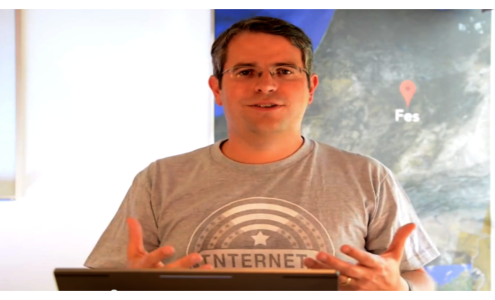Matt Cutts Tells Guest Bloggers for SEO to “Stick a Fork in It”

Google has sent out multiple warnings about reasonable guest blogging and the proper practices that should go with it. It was just last Friday that Moz released a blog warning people about the dangers that come with guest blogging, and now Matt Cutts has spoken: he is discouraging guest blogging for SEO.
Matt Cutts in one of the Google Webmaster Help videos discussing guest blogging
“Stick a Fork in It: Guest Blogging is Done”
In his personal blog, he talked about the decay of guest blogging for SEO. He cited the fact that guest blogging was becoming more and more spammy over time because of people offering money to get links from guest posts.
“Back in the day, guest blogging used to be a respectable thing, much like getting a coveted, respected author to write the introduction of your book. It’s not that way anymore,” Cutts began explaining. He then proceeded to quote a spam email message offering to pay him money for posting guest blogs on his page.
“Someone sent me a spam email offering money to get links that pass PageRank. That’s a clear violation of Google’s quality guidelines,” he noted.
“Ultimately, this is why we can’t have nice things in the SEO space: a trend starts out as authentic. Then more and more people pile on until only the barest trace of legitimate behavior remains. We’ve reached the point in the downward spiral where people are hawking ‘guest post outsourcing’ and writing articles about ‘how to automate guest blogging’.”
“So stick a fork in it: guest blogging is done; it’s just gotten too spammy.”
Proper Guest Blogging
To clarify, Cutts isn’t discouraging guest blogging entirely – just guest blogging for SEO. “In general I wouldn’t recommend accepting a guest blog post unless you are willing to vouch for someone personally or know them well. Likewise, I wouldn’t rely on guest posting, guest blogging sites, or guest blogging SEO as a linkbuilding strategy,” he explained earlier in his blog.
He clarified later on that he was only referring to guest blogging for SEO in his post. “There are still many good reasons to do some guest blogging (exposure, branding, increased reach, community, etc.),” he explained. “Those reasons existed way before Google and they’ll continue into the future.”
In the blog and in his comments afterwards, he mentions instances when guest blogging is an acceptable practice:
- If you have high-quality blogs with new and relevant information to share
- If you know a guest blogger personally and are willing to vouch for the person when they post on your blog
- If you are willing to nofollow the links on your guest posts
- If you are doing guest blogging for the reasons mentioned awhile ago and not for link building purposes
He also provided his previous videos for reference on guest blogging warnings:
- What is Google’s view on guest blogging for links? (posted October 9, 2012)
- Does Google take action on spammy guest blogging activities? (posted November 12, 2012)
- How can I guest blog without it appearing as if I paid for links? (posted October 16, 2013)
- What should I be aware of if I’m considering guest blogging? (posted December 10, 2013)
What This Means for You
You need to check if any of the guest blogs you have right now are in danger of being flagged as spam. Any blogs that have dofollowed links and keyword-optimized anchor texts are candidates for this.
You’ll also need to focus on creating and publishing your own high-quality content while you build relationships with industry influencers that will vouch for you when you contribute a guest post to their blog. This way, you’ll be building your reputation as a reliable information source.
Finally, if you really need to include a link in your guest blog, make sure to nofollow the link as Cutts recommends. This will send them a signal that your intent is not to build links, but to provide useful information to that blog’s readers.
We’d be glad to help audit your guest blogs and other links and identify which ones may be flagged as spam. Talk to us today and we’ll help you develop a content marketing strategy that builds your brand effectively without having to resort to spam.






